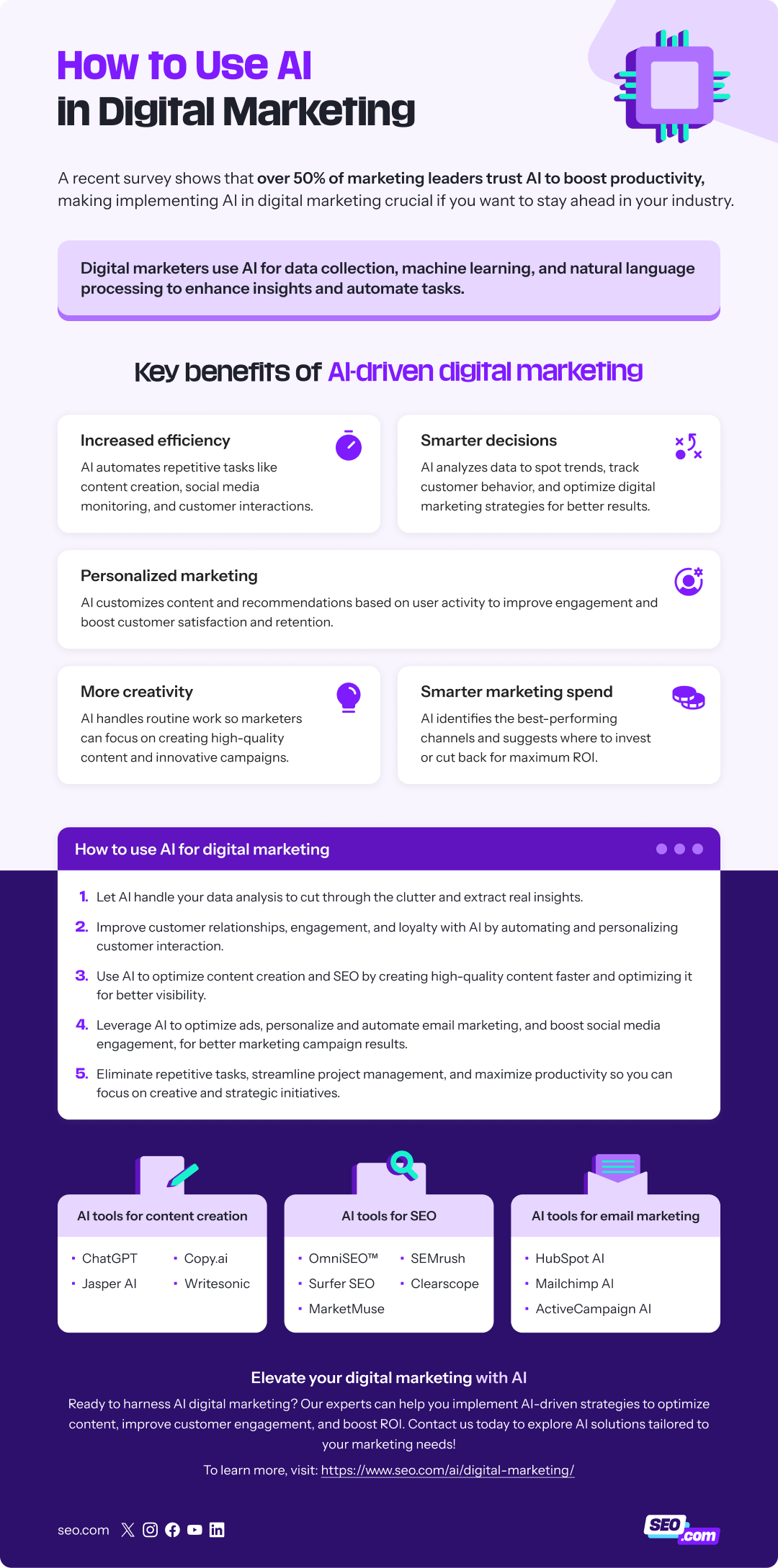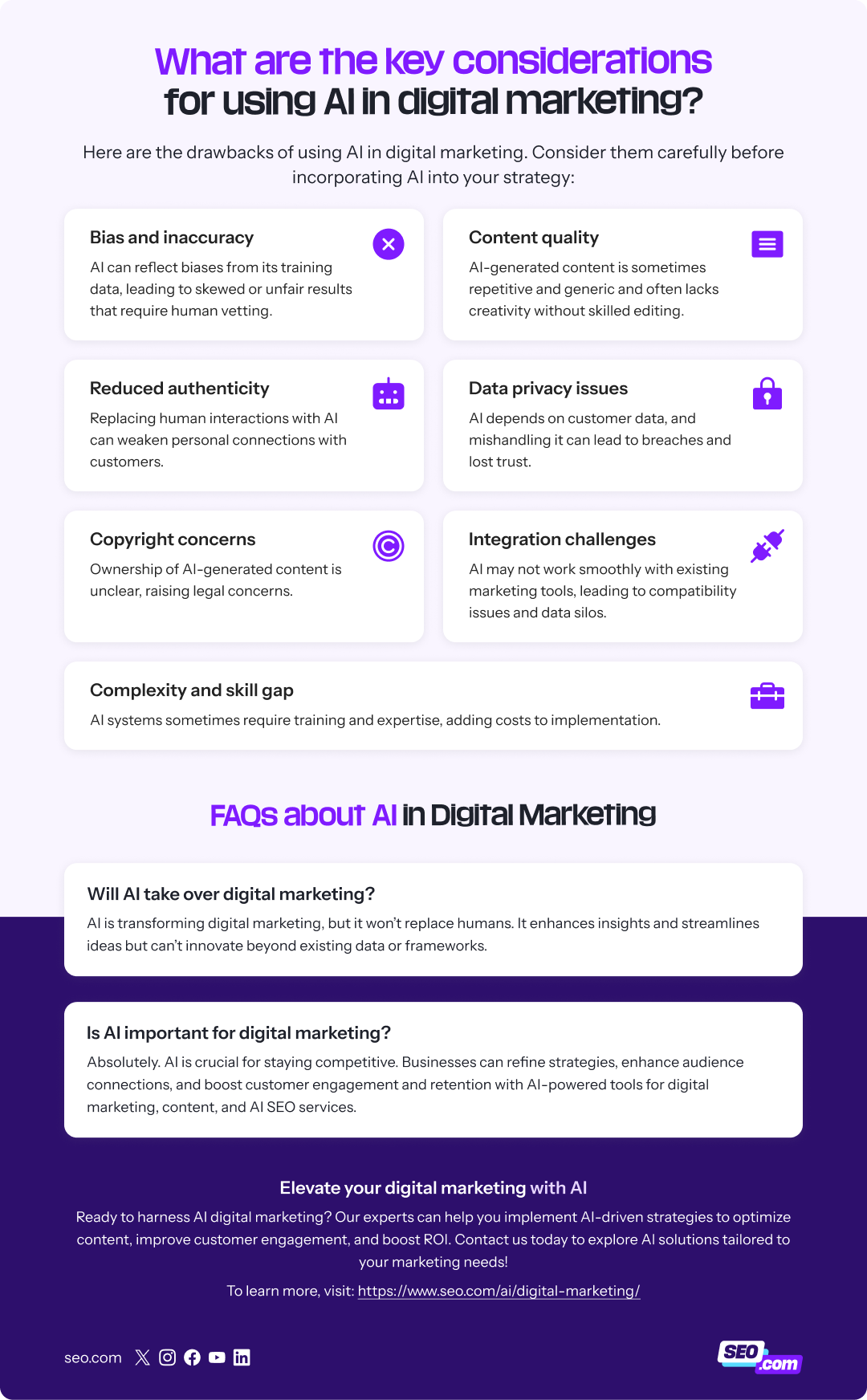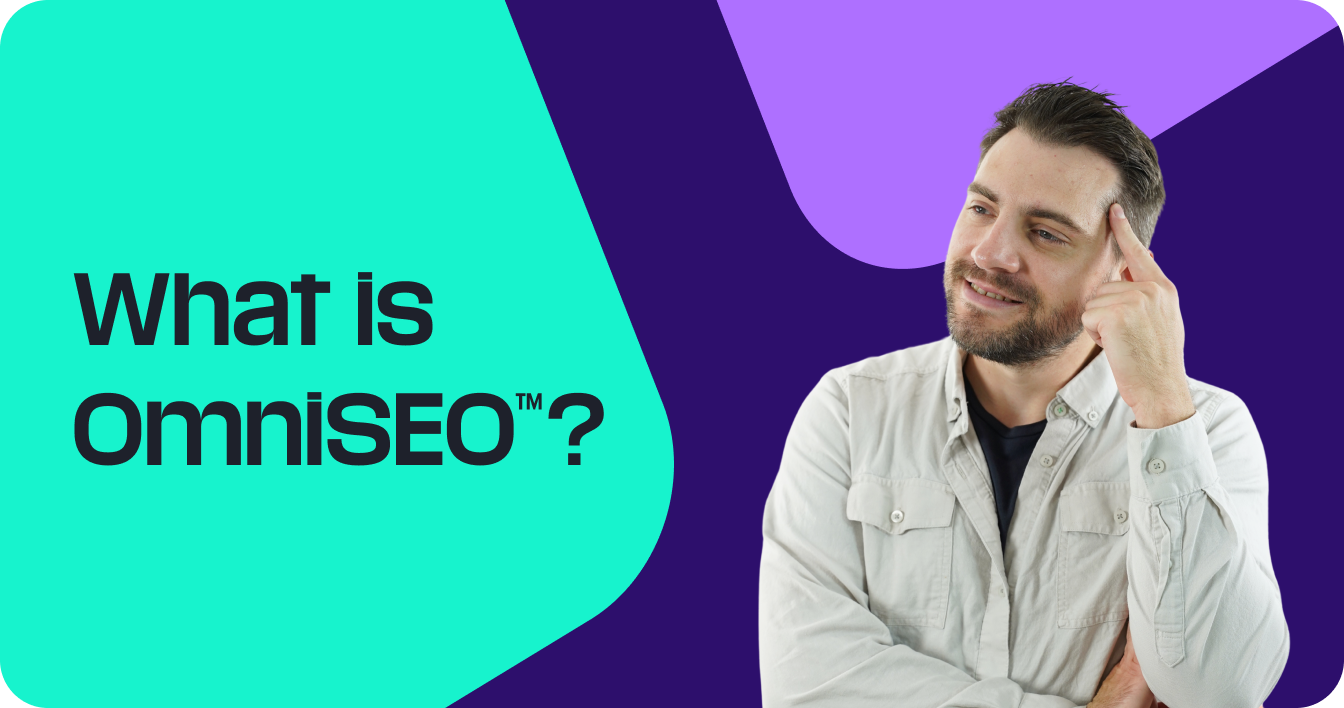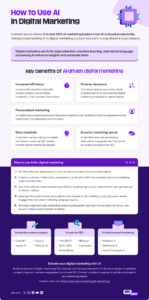Artificial Intelligence (AI) is a game-changer for digital marketing, transforming how teams work to improve customer engagement and sales. A recent survey shows that over 50% of marketing leaders trust AI to boost productivity, making implementing AI in digital marketing crucial if you want to stay ahead in your industry.
In this article, we’ll dive into the following:
Understanding AI digital marketing
Digital marketers use AI for data collection, machine learning, and natural language processing to enhance insights and automate tasks. AI is here to stay — it’s expected to exceed $3 trillion in value by 2034. But rather than replacing human effort, AI complements it.
By analyzing data and personalizing customer experiences, AI maximizes marketing efforts and helps you make smarter decisions to deliver more relevant content to your audiences.

Key benefits of AI-driven digital marketing
Investing in AI for digital marketing is a smart move. Check out the benefits of adopting an AI-driven approach to marketing:
- Increased efficiency: AI automates repetitive tasks like content creation, social media monitoring, and customer interactions, helping you launch campaigns faster and stay ahead of competitors.
- Smarter decisions: AI analyzes data to spot trends, track customer behavior, and optimize digital marketing strategies for better results.
- Personalized marketing: AI customizes content and recommendations based on user activity to improve engagement and boost customer satisfaction and retention.
- More creativity: AI handles routine work so marketers can focus on creating high-quality content and innovative campaigns.
- Smarter marketing spend: AI identifies the best-performing channels and suggests where to invest or cut back for maximum ROI.
How to use AI for digital marketing
Here are five ways to start using AI for digital marketing:
1. Let AI handle your data analysis
Struggling with data overload from multiple channels? Leverage AI to cut through the clutter and extract real insights.
- Analyze massive datasets: Use tools such as Google Analytics 4 (GA4) that has AI features to spot trends, flag anomalies, and predict customer behavior based on past interactions. Then, adjust your marketing strategies for better engagement.
- Turn customer feedback into action: AI-powered text analytics can sift through reviews and social media comments to uncover key consumer preferences. Use insights from the data analysis to refine marketing strategies and messaging and improve customer experience.
- Streamline analytics across platforms: Use AI tools such as Supermetrics to consolidate data from various sources, to save time and improve accuracy.
2. Improve customer relationships with AI
Use AI to automate and personalize customer interaction to boost engagement and build customer satisfaction and loyalty.
- Segment and target smarter: Use AI tools, Segment by Twilio, BlueConic, and others, to analyze purchase history, behaviors, and demographics. They’ll help you create highly targeted customer segments, identify qualified leads, and send personalized messages to increase conversions.
- Automate customer support: AI-powered chatbots on Drift AI, Zendedk AI, Ada, and other customer relationship management (CRM) tools provide instant responses, route queries efficiently, and assist human reps by summarizing ticket histories and suggesting relevant solutions. Use them to reduce response time.
- Predict customer needs: Marketing AI tools, Freshsales and Zoho CRM AI (Zia) spot trends and anticipate behaviors. Use AI-driven insights to optimize customer relationship management (CRM), tailor recommendations, and enhance retention.
- Unify data for better decisions: AI tools such as HubSpot AI and Salesforce Einstein AI consolidate data across platforms, giving you a 360-degree view of your customers. With these tools, you can streamline marketing efforts, save time, and make data-driven decisions.
3. Use AI to optimize content creation and SEO
Leverage AI to streamline your content marketing and search engine optimization(SEO) efforts by creating high-quality content faster and optimizing it for better visibility.
- Automate content creation: Use digital marketing AI tools like ChatGPT (OpenAI), Jasper AI, Copy.ai, and Writesonic to generate blog post ideas, social media captions, and ad copy tailored for different platforms. Also, create images, eye-catching infographics, and engaging videos with AI-powered design tools such as Canva, Adobe Firefly, Runway ML, InVideo, and Lumen5.
- Optimize for SEO with AI: Let SEO AI tools, Surfer SEO, Clearscope, SEMrush, MarketMuse, etc., handle the heavy lifting in keyword research, trend analysis, and metadata optimization. AI-generated structured data and title tags can improve voice and visual search results.
- Enhance content quality: AI helps refine messaging based on customer search intent. But don’t forget to fact-check and fine-tune AI-generated content to keep it accurate, authentic, and on-brand.
- Make data-driven content decisions: AI consolidates insights from multiple platforms, helping you track performance, engagement, and SEO impact. Use these insights to adjust strategies and maximize content effectiveness.
- Schedule content for publishing: Use Buffer AI, Vista Social, Sprout Social, Lately AI, and other digital marketing tools to automate content generation, social media scheduling, and content repurposing.
To get the most out of your content and SEO efforts, make OmniSEO a key part of your digital marketing strategy. OmniSEO ensures your content is optimized across search engines, social media, voice assistants, and AI-driven tools so your brand stays visible and consistent everywhere your audience is. Since people interact with brands on multiple platforms, OmniSEO has a multi-channel function that helps keep your brand messaging uniform, boosting visibility, engagement, and user experience.
4. Leverage AI for better marketing campaign results
Here’s how you can optimize AI for better campaign results.
- Optimize digital ads for maximum ROI: Use Google Ads AI, Adzooma, or Revealbot to analyze performance and adjust bids for better efficiency. Also, personalize ad targeting with Meta Advantage+ and Smartly.io, which refine audience segmentation and deliver relevant content to the right users.
- Personalize and automate email marketing: Enhance subject lines and improve open rates with Seventh Sense, Phrasee, and Persado. Optimize send times and tailor content with HubSpot AI, Mailchimp AI, and ActiveCampaign AI to drive higher conversions.
- Boost social media engagement: Automate captions and hashtags with AI tools like Flick AI and Copy.ai.
5. Automate tasks for smooth workflows
Implementing AI in digital marketing can significantly enhance task automation, freeing up valuable time for marketers.
- Eliminate repetitive tasks: Use AI tools like Zapier to automate data entry, performance reporting, and contact management, freeing up valuable time for high-impact work.
- Streamline project and campaign management: AI tools such as Make, Trello with Butler AI, monday.com, and Asana to track deadlines automatically. Use them to keep projects on schedule, monitor workloads, balance team resources efficiently, and effortlessly automate content publishing and report generation.
- Maximize productivity: Use AI-powered tools to save marketers an average of 2 hours and 24 minutes daily (HubSpot AI report). Spend that extra time on creative and strategic initiatives to drive better results.
Learn how marketers are using AI in marketing in 2025, check out insights from the latest AI statistics.
What are the key considerations for using AI in digital marketing?
Here are the drawbacks of using AI in digital marketing. Consider them carefully before incorporating AI into your strategy:

- Bias and inaccuracy: AI can reflect biases from its training data, leading to skewed or unfair results that require human vetting. This is also one of the reasons why AI will not replace Google Search in the near future.
- Content quality: AI-generated content is sometimes repetitive and generic and often lacks creativity without skilled editing.
- Reduced authenticity: Replacing human interactions with AI can weaken personal connections with customers.
- Data privacy issues: AI depends on customer data, and mishandling it can lead to breaches and lost trust.
- Copyright concerns: Ownership of AI-generated content is unclear, raising legal concerns.
- Integration challenges: AI may not work smoothly with existing marketing tools, leading to compatibility issues and data silos.
- Complexity and skill gap: AI systems sometimes require training and expertise, adding costs to implementation.
FAQs about AI in digital marketing
Will AI take over digital marketing?
AI is transforming digital marketing, but it won’t replace humans. It enhances insights and streamlines ideas but can’t innovate beyond existing data or frameworks.
Is AI important for digital marketing?
Absolutely. AI is crucial for staying competitive. Businesses can refine strategies, enhance audience connections, and boost customer engagement and retention with AI-powered tools for digital marketing, content, and AI SEO services.
Elevate your digital marketing with AI
Ready to harness AI digital marketing? Our experts can help you implement AI-driven strategies to optimize content, improve customer engagement, and boost ROI. Contact us today to explore AI solutions tailored to your marketing needs!
Let’s Drive Results Together 
Related Resources
- AI Overviews: Everything You Need to Know As an SEO
- ChatGPT & AI SEO: How to Rank in ChatGPT Responses
- Google Gemini & AI SEO: How to Rank in Gemini’s Answers
- How to Rank on Answer Engines: 7 Most Effective Tactics
- Meet SEO’s New Era: Search Everywhere Optimization
- OmniSEO™ – Rank Everywhere
- OmniSEO™ – Rank Everywhere
- Perplexity and AI SEO: How to Rank in Perplexity Answers
- What is Answer Engine Optimization? The SEO’s Guide to AEO
Writers


Free download: Guide to AI in Digital Marketing

Meet
The top digital marketing company behind SEO.com.
Ready to get results? Connect with us, today!



